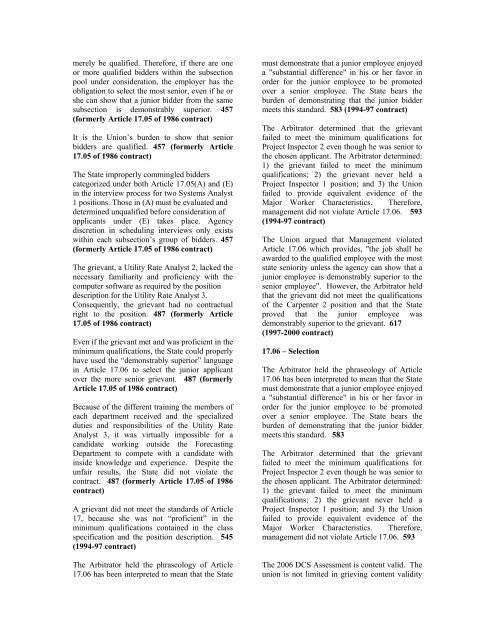by Contract Number (PDF) - OCSEA
by Contract Number (PDF) - OCSEA
by Contract Number (PDF) - OCSEA
Create successful ePaper yourself
Turn your PDF publications into a flip-book with our unique Google optimized e-Paper software.
merely be qualified. Therefore, if there are one<br />
or more qualified bidders within the subsection<br />
pool under consideration, the employer has the<br />
obligation to select the most senior, even if he or<br />
she can show that a junior bidder from the same<br />
subsection is demonstrably superior. 457<br />
(formerly Article 17.05 of 1986 contract)<br />
It is the Union’s burden to show that senior<br />
bidders are qualified. 457 (formerly Article<br />
17.05 of 1986 contract)<br />
The State improperly commingled bidders<br />
categorized under both Article 17.05(A) and (E)<br />
in the interview process for two Systems Analyst<br />
1 positions. Those in (A) must be evaluated and<br />
determined unqualified before consideration of<br />
applicants under (E) takes place. Agency<br />
discretion in scheduling interviews only exists<br />
within each subsection’s group of bidders. 457<br />
(formerly Article 17.05 of 1986 contract)<br />
The grievant, a Utility Rate Analyst 2, lacked the<br />
necessary familiarity and proficiency with the<br />
computer software as required <strong>by</strong> the position<br />
description for the Utility Rate Analyst 3.<br />
Consequently, the grievant had no contractual<br />
right to the position. 487 (formerly Article<br />
17.05 of 1986 contract)<br />
Even if the grievant met and was proficient in the<br />
minimum qualifications, the State could properly<br />
have used the “demonstrably superior” language<br />
in Article 17.06 to select the junior applicant<br />
over the more senior grievant. 487 (formerly<br />
Article 17.05 of 1986 contract)<br />
Because of the different training the members of<br />
each department received and the specialized<br />
duties and responsibilities of the Utility Rate<br />
Analyst 3, it was virtually impossible for a<br />
candidate working outside the Forecasting<br />
Department to compete with a candidate with<br />
inside knowledge and experience. Despite the<br />
unfair results, the State did not violate the<br />
contract. 487 (formerly Article 17.05 of 1986<br />
contract)<br />
A grievant did not meet the standards of Article<br />
17, because she was not “proficient” in the<br />
minimum qualifications contained in the class<br />
specification and the position description. 545<br />
(1994-97 contract)<br />
The Arbitrator held the phraseology of Article<br />
17.06 has been interpreted to mean that the State<br />
must demonstrate that a junior employee enjoyed<br />
a "substantial difference" in his or her favor in<br />
order for the junior employee to be promoted<br />
over a senior employee. The State bears the<br />
burden of demonstrating that the junior bidder<br />
meets this standard. 583 (1994-97 contract)<br />
The Arbitrator determined that the grievant<br />
failed to meet the minimum qualifications for<br />
Project Inspector 2 even though he was senior to<br />
the chosen applicant. The Arbitrator determined:<br />
1) the grievant failed to meet the minimum<br />
qualifications; 2) the grievant never held a<br />
Project Inspector 1 position; and 3) the Union<br />
failed to provide equivalent evidence of the<br />
Major Worker Characteristics. Therefore,<br />
management did not violate Article 17.06. 593<br />
(1994-97 contract)<br />
The Union argued that Management violated<br />
Article 17.06 which provides, "the job shall be<br />
awarded to the qualified employee with the most<br />
state seniority unless the agency can show that a<br />
junior employee is demonstrably superior to the<br />
senior employee". However, the Arbitrator held<br />
that the grievant did not meet the qualifications<br />
of the Carpenter 2 position and that the State<br />
proved that the junior employee was<br />
demonstrably superior to the grievant. 617<br />
(1997-2000 contract)<br />
17.06 – Selection<br />
The Arbitrator held the phraseology of Article<br />
17.06 has been interpreted to mean that the State<br />
must demonstrate that a junior employee enjoyed<br />
a "substantial difference" in his or her favor in<br />
order for the junior employee to be promoted<br />
over a senior employee. The State bears the<br />
burden of demonstrating that the junior bidder<br />
meets this standard. 583<br />
The Arbitrator determined that the grievant<br />
failed to meet the minimum qualifications for<br />
Project Inspector 2 even though he was senior to<br />
the chosen applicant. The Arbitrator determined:<br />
1) the grievant failed to meet the minimum<br />
qualifications; 2) the grievant never held a<br />
Project Inspector 1 position; and 3) the Union<br />
failed to provide equivalent evidence of the<br />
Major Worker Characteristics. Therefore,<br />
management did not violate Article 17.06. 593<br />
The 2006 DCS Assessment is content valid. The<br />
union is not limited in grieving content validity
















